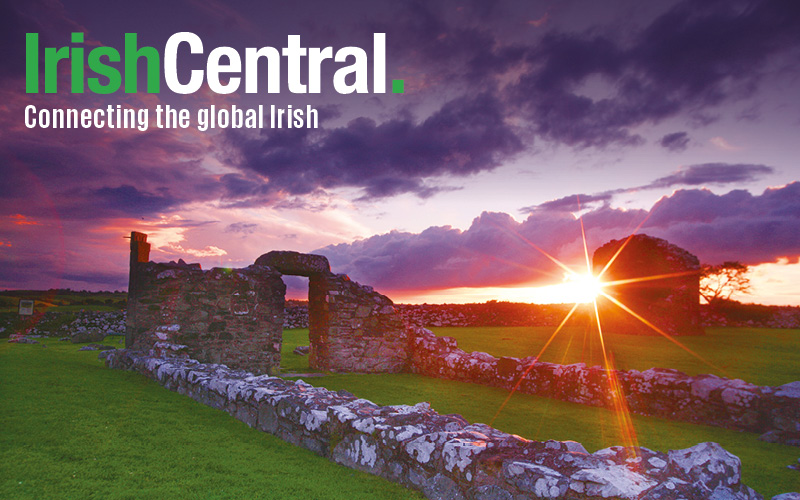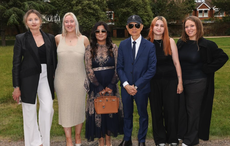“Embrace disruption but amidst that disruption, remember that the constant is people, our relationships with people and how we treat them and interact with them,” was the closing advice from Rosaleen Blair, founder and CEO of Alexander Mann Solutions, as she addressed a large crowd of UCD alumni and the Irish International Business Network in New York on Tuesday, October 18.
Named as one of the Best Bosses in the UK 2016 by The Telegraph with a 96 percent approval rating, and previously heralded as 2007 UK Veuve Clicquot Businesswoman of the Year, one might expect Blair to be intimidating or hard to approach. But breaking from any CEO stereotype, the Dublin woman lives by her relationships, delivering a heart-warming and endearing keynote speech about her upbringing in Dublin, her first business ventures in the city, and her move to London where she still lives and works today.
Along the way, Blair cut the tops off newspapers for her local newsagents, aged ten, so she could buy herself elocution lessons; bought herself her first clipboard as she met with the first client of her nanny service, who would go on to be one of her best friends; and despite once describing herself as “just ordinary,” she established the world’s leading providers of talent acquisition and management services in Alexander Mann.
All of this, she believes, is down to remembering “relationships are the constant,” insisting that the personal element, along with “strong emotional intelligence, being a good listener, and being empathetic,” are enough to drive anyone through the changing world.
“You make your own luck but I think you need to recognize an opportunity when it comes along and grab it and I think I’ve had a lot of opportunities and I’ve taken every one of them,” Blair told IrishCentral after her address.
Blair was adopted into a religious Dublin family whose home shared a wall with another Irish entrepreneur, Bono, on Cedarwood Road. Although her family was disappointed she never became a nun, despite being active in the fight for social justice in her youth, Blair did eventually become a Bishop, she jokes, referring to her husband’s surname. The award-winning CEO now finds herself lucky enough to be in a position to give back the way she wished to when she was younger, however, something she does with vigor through charities such as the Prince’s Trust in the UK and through tutoring and mentoring with smaller businesses.
Hearing Blair talk about her own success, it’s hard to believe that not only did she not have the opportunity to attend university, something expected from young people who wish to succeed in 2016, but that she was diagnosed with dyslexia just two years before she finished school, making her academic life more challenging.
“I had to be agile and think outside the box,” she said of these difficulties, both traits that stayed with her as she moved to London in 1995, intent on learning all she could about running a business when not able to learn about it on a third-level platform.
Already having established a successful business in advertising prepackaged talent throughout Ireland, Italy, and France, Blair was quickly horrified by what she saw in talent acquisition in London, where nobody appeared to want to be in the business and self-esteem in the industry was extremely low.
And so, she decided to disrupt once again, she claims, hoping to challenge the norm inside the industry by being “distinctive” and showing “bravery.”
The courage paid off, as not only has she herself been successful in her role but the company itself has grown to over 3,000 employees in 80 different countries. The company has been steered gracefully through a management buyout, three private equity relationships and the global financial crisis by their female CEO, who has created a working environment of female solidarity at the same time.
“I tried to create an environment in which women could be successful as well,” Blair told IrishCentral. “So 70 percent of the people working in the company are women, and working at every level of the organization.”
Also speaking at the joint UCD-IBN event were Olympic silver medallists Gary and Paul O’Donovan, another pairing who found not only success through sport but success through their own development of a strong relationship with the Irish media, granted on a less than intentional basis.
The Co. Cork brothers were warmly welcomed by the New York crowd eager to hear from the rowing duo who shot into the spotlight in Rio for what were described as their “very Irish” interviews.
Speaking of their own determination, Gary O’Donovan described his brother Paul’s belief from a young age that he could be the best, always trying to keep ahead of three older rowers in their local club who had previously completed at an Olympic medal. It was when Paul began bringing home medals that Gary questioned why he too couldn’t be the best, as their “natural progression” into competitive rowing began.
Both still college students, Gary graduated from Marketing in CIT just last month while Paul is currently in his final year in UCD. Both brothers plan to continue with their education as it “works well with the rowing.”
Even this comes with sacrifice, however, Paul drawing laughs from the crowd in explaining their habit of going out every once in awhile to drink with friends until Christmas time, when this would come to an end, a practice they're ready to forego so as to compete on the international stage. College can also be ideal, the younger brother explained to further laughs, as the pair can “get a break from each other” and “talk about something else other than rowing.”
Swarmed by Irish fans as they flew into Boston’s Logan airport, the mania around the brothers has yet to calm down, with people “falling over” to even carry their supportive grandmother’s shopping bags home.
The level of support from the Irish public continues still weeks after the Olympics despite the Irish scandal, something both brothers felt did not affect Irish teams enjoyment of the Games. Gary talked about receiving messages from friends in Ireland with headlines about everything from the controversy with the Irish boxers to the standard of water in Rio, criticism that wasn’t having any effect on the spirits in the Ireland camp.
You can find more information on the IIBN and their various international branches here.




Comments